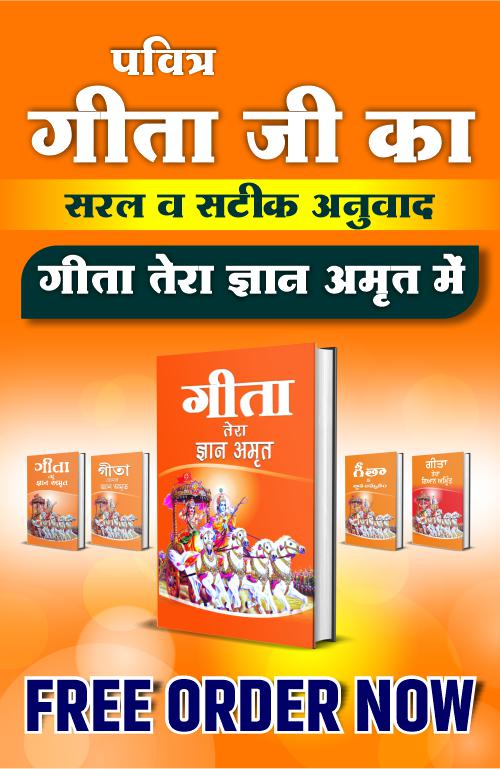
Question: - God is said to be unborn, changeless and immortal. It has been proved from the abovementioned account and evidence that Shri Brahma, Shri Vishnu and Shri Shankar, the three gods are mortal; then who is the immortal God? Are Brahma, Vishnu and Shankar and Kaal Brahma not God? Please explain with evidence.
Answer: - Let us first clarify whether Shri Brahma, Shri Vishnu, Shri Shankar and Brahm are God or not. You have already proved this in your question that God is unborn, that is, He who has never taken birth. It has been proved from the afore-mentioned description and evidence that Brahma, Vishnu and Shankar have mother & father. Brahm (Kaal) is also mortal. He has also taken birth. It is self-evident from this that he is not God. Now the question remains - then who is immortal? In its answer, let us prove from Shrimad Bhagavad Gita itself that the immortal God is someone different to the giver of the knowledge of Gita.
Evidence no. 1: In Shrimad Bhagavad Gita Chapter 2 Verse 12, Gita Chapter 4 Verse 5, Gita Chapter 10 Verse 2, the giver of the knowledge of Gita has clarified his state that I have an origin; I take birth and die. Arjun, you and I have had several births. I am also mortal. In Gita Chapter 2 Verse 17 also, he has stated that consider Him to be immortal, whom nobody is capable of killing, and the God who has created everyone. This is the first evidence of Immortal God.
Evidence no. 2: - In Shrimad Bhagavad Gita Chapter 15 Verse 16-17, three Purush (God) have been mentioned. It is stated in Gita Chapter 15 Verse 16 that two Purush (God) are famous in this world – Kshar Purush and Akshar Purush. These two gods and all the living beings under them are mortal. Everyone’s soul is immortal. In Gita Chapter 15 Verse 17, it is stated that the Uttam Purush (Supreme God), that is, Purushottam is someone else, who is said to be God, who sustains everyone by entering into the three worlds. In reality, He is immortal.
It has been stated in Gita Chapter 7 Verse 29 that those worshippers who only strive to become free from the suffering of (jaraa) old age and (maran) death, they know “Tat Brahm”; they are familiar with all the actions and the entire spirituality. In Gita Chapter 8 Verse 1, Arjun asked that - What is “Tat Brahm”? In Chapter 8 Verse 3, the Giver of the knowledge of Gita replied that - He is “Param Akshar Brahm”, that is, He is Param Akshar Purush (Supreme God). In Gita Chapter 15 Verse 17, “Uttam PurushH tu anyaH Parmatma iti udaahrtH” that has been stated, He is “Param Akshar Brahm”. He only has been called as Purushottam (Supreme God).
Resolution of Doubt
In Gita Chapter 15 Verse 18, the giver of the knowledge of Gita has said that I am superior, that is, powerful to all those living beings who live in my 21 brahmands (universes); therefore, based on Lokved, that is, the folklore, I am famous as Purushottam. Actually, one who is Purushottam has been clarified in Gita Chapter 15 Verse 17. The Uttam Purush (Supreme God), that is, Purushottam is different from Kshar Purush (Giver of the knowledge of Gita) and Akshar Purush (who is the master of 7 Shankh Brahmands). He only is said to be God. He sustains everyone. In reality, He is immortal. He is “Param Akshar Brahm”, who is the master of infinite brahmands (universes). He is the Creator of all, the Master of the lineage, that is, He is God.
